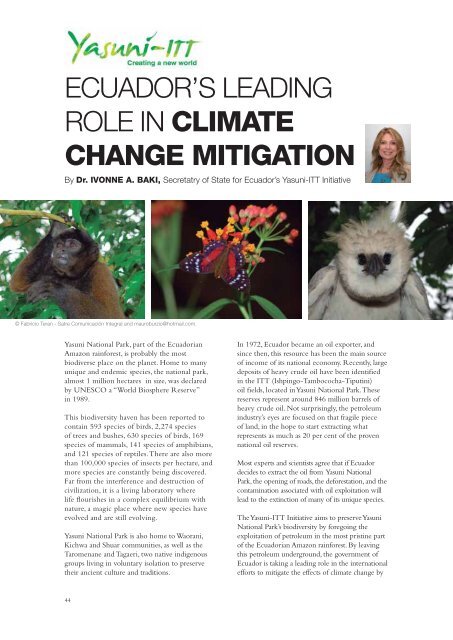Climate Action 2012-2013
You also want an ePaper? Increase the reach of your titles
YUMPU automatically turns print PDFs into web optimized ePapers that Google loves.
ECUADOR’S LEADING<br />
ROLE IN CLIMATE<br />
CHANGE MITIGATION<br />
By Dr. IVONNE A. BAKI, Secretatry of State for Ecuador’s Yasuni-ITT Initiative<br />
© Fabricio Teran - Satre Comunicación Integral and mauroburzio@hotmail.com.<br />
Yasuni National Park, part of the Ecuadorian<br />
Amazon rainforest, is probably the most<br />
biodiverse place on the planet. Home to many<br />
unique and endemic species, the national park,<br />
almost 1 million hectares in size, was declared<br />
by UNESCO a “World Biosphere Reserve”<br />
in 1989.<br />
This biodiversity haven has been reported to<br />
contain 593 species of birds, 2,274 species<br />
of trees and bushes, 630 species of birds, 169<br />
species of mammals, 141 species of amphibians,<br />
and 121 species of reptiles. There are also more<br />
than 100,000 species of insects per hectare, and<br />
more species are constantly being discovered.<br />
Far from the interference and destruction of<br />
civilization, it is a living laboratory where<br />
life flourishes in a complex equilibrium with<br />
nature, a magic place where new species have<br />
evolved and are still evolving.<br />
Yasuni National Park is also home to Waorani,<br />
Kichwa and Shuar communities, as well as the<br />
Taromenane and Tagaeri, two native indigenous<br />
groups living in voluntary isolation to preserve<br />
their ancient culture and traditions.<br />
In 1972, Ecuador became an oil exporter, and<br />
since then, this resource has been the main source<br />
of income of its national economy. Recently, large<br />
deposits of heavy crude oil have been identified<br />
in the ITT (Ishpingo-Tambococha-Tiputini)<br />
oil fields, located in Yasuni National Park. These<br />
reserves represent around 846 million barrels of<br />
heavy crude oil. Not surprisingly, the petroleum<br />
industry’s eyes are focused on that fragile piece<br />
of land, in the hope to start extracting what<br />
represents as much as 20 per cent of the proven<br />
national oil reserves.<br />
Most experts and scientists agree that if Ecuador<br />
decides to extract the oil from Yasuni National<br />
Park, the opening of roads, the deforestation, and the<br />
contamination associated with oil exploitation will<br />
lead to the extinction of many of its unique species.<br />
The Yasuni-ITT Initiative aims to preserve Yasuni<br />
National Park’s biodiversity by foregoing the<br />
exploitation of petroleum in the most pristine part<br />
of the Ecuadorian Amazon rainforest. By leaving<br />
this petroleum underground, the government of<br />
Ecuador is taking a leading role in the international<br />
efforts to mitigate the effects of climate change by<br />
44












